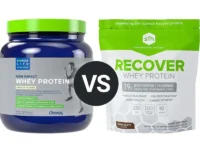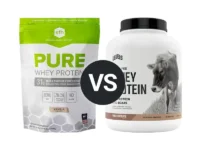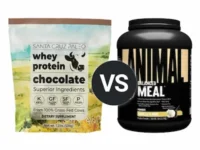Knowledge BaseYou're Questions Answered
Is it worth paying extra for protein powder without artificial ingredients?
When choosing a protein powder, many consider the presence or absence of artificial ingredients as a critical factor. Artificial ingredients often include synthetic substances such as flavors, sweeteners, and preservatives, which are added to enhance taste, texture, and shelf life. The decision to pay extra for a protein powder without artificial ingredients ultimately depends on individual preferences, health concerns, and values. Below, we explore the potential benefits and drawbacks of choosing protein powders without artificial ingredients and whether the additional cost is justified.
Understanding Artificial Ingredients
Artificial ingredients refer to synthetic compounds added to foods and supplements, including artificial sweeteners (like aspartame and sucralose), artificial flavors, and preservatives. While these ingredients can make products more palatable and extend shelf life, they are sometimes associated with health concerns. For instance, some studies have suggested that certain artificial sweeteners may be linked to negative health effects, such as metabolic disturbances and increased risk of cancer, though more research is needed to confirm these findings1. Additionally, artificial colors and preservatives have been associated with behavioral and cognitive effects in children2.
Benefits of Choosing Protein Powders Without Artificial Ingredients
-
Potential Health Benefits
Protein powders made with natural ingredients, such as stevia or monk fruit extract, can be a safer option for those concerned about the long-term health effects of artificial ingredients. Natural sweeteners and flavors may offer additional health benefits, such as improved blood sugar control and reduced inflammation3. For individuals with food sensitivities or allergies, natural ingredients may also be easier to digest and less likely to cause adverse reactions.
-
Higher Quality Ingredients
Products without artificial ingredients are often made with higher-quality ingredients overall. Manufacturers of these products may prioritize sourcing high-quality, minimally processed ingredients, which can enhance the overall nutritional profile of the protein powder. This focus on quality can be particularly important for those who prioritize clean eating and want to avoid synthetic additives.
-
Better Taste and Digestibility
Many consumers find that protein powders without artificial ingredients have a more natural and pleasant taste. Additionally, natural ingredients can sometimes improve digestibility, reducing the likelihood of gastrointestinal discomfort that some people experience with artificial additives.
Drawbacks and Considerations
-
Higher Cost
Protein powders without artificial ingredients are often more expensive than those with synthetic additives. This price difference can be attributed to the cost of sourcing high-quality, natural ingredients and the more stringent manufacturing processes required to maintain product integrity. For budget-conscious consumers, the higher cost may be a significant consideration.
-
Shorter Shelf Life
Without artificial preservatives, protein powders may have a shorter shelf life, requiring more careful storage and potentially leading to waste if not consumed promptly. Consumers need to consider their usage habits and storage conditions when opting for products without preservatives.
-
Availability and Variety
While the market for clean-label protein powders is growing, the variety may still be limited compared to products containing artificial ingredients. Consumers may have fewer flavor options or find it challenging to locate specific types of protein powders without synthetic additives.
- Magnuson, B. A., Roberts, A., & Nestmann, E. R. (2017). Critical review of the current literature on the safety of sucralose. Food Chem Toxicol, 106(Pt A), 324-355.
- McCann, D., Barrett, A., Cooper, A., et al. (2007). Food additives and hyperactive behaviour in 3-year-old and 8/9-year-old children in the community: a randomized, double-blinded, placebo-controlled trial. Lancet, 370(9598), 1560-1567.
- Carakostas, M. C., Curry, L. L., Boileau, A. C., & Brusick, D. J. (2008). Overview: the history, technical function and safety of rebaudioside A, a naturally occurring steviol glycoside, for use in food and beverages. Food Chem Toxicol, 46(Suppl 7), S1-S10.
Your Answer
We are a participant in the Amazon Services LLC Associates Program, an affiliate advertising program designed to provide a means for us to earn fees by linking to Amazon.com and affiliated sites.


